If x=sin(α−β)sin(γ−δ)y=sin(β−γ)sin(α−δ)andz=sin(γ−α)sin(β−δ) then Solution in Telugu
x+y+z=0
x+y−z=0
y+z−x=0
x3+y3)+z3=3xyz
The correct Answer is:A, D
Step by step video, text & image solution for If x = sin (alpha - beta) sin (gamma - delta) y = sin (beta - gamma) sin (alpha - delta ) and z = sin (gamma - alpha ) sin (beta - delta ) then by Maths experts to help you in doubts & scoring excellent marks in Class 11 exams.
Updated on:21/07/2023Topper's Solved these Questions
- TRANSFORMATIONS BOOK - AAKASH SERIESCHAPTER - TRANSFORMATIONS EXERCISE - LACTURE SHEET (EXERCISE-I Linked Comprehnsion Type Questions)
5 Videos
- TRANSFORMATIONS BOOK - AAKASH SERIESCHAPTER - TRANSFORMATIONS EXERCISE - LACTURE SHEET (EXERCISE-I Matrix Matching Type Questions)
5 Videos
- TRANSFORMATIONS BOOK - AAKASH SERIESCHAPTER - TRANSFORMATIONS EXERCISE - LACTURE SHEET (EXERCISE-I Straight Objective Type Questions)
28 Videos
- TANGENT AND NORMAL BOOK - AAKASH SERIESCHAPTER - TANGENT AND NORMAL EXERCISE - ADVANCED SUBJECTIVE TYPE QUESTIONS
48 Videos
- TRIGNOMETRIC EQUATIONSBOOK - AAKASH SERIESCHAPTER - TRIGNOMETRIC EQUATIONSEXERCISE - ADDITIONAL PRACTICE EXERCISE (PRACTICE SHEET (ADVANCED) INTEGER TYPE QUESTIONS)
2 Videos
Similar Questions
sinα+sinβ=14andcosα+cosβ=13
The value of sin(α+β) is
View SolutionIf cosα+cosβ=1/2andsinα+sinβ=1/3, then

View Solutioncos56∘+cos58∘−cos66∘−4cos28∘cos29∘sin33∘=
View SolutionFind the equations of tangent and normal to the curve
(xa)4+(yb)4=2 at (a,b)
View SolutionIf 0≤x≤2π and 2cosec2x√12y2−y+1≤√2 then the number of ordered pairs of (x,y) is
View SolutionWithout expanding evaluate the determinant ∣∣ ∣ ∣∣sinαcosαsin(α+δ)sinβcosβsin(β+δ)sinγcosγsin(γ+δ)∣∣ ∣ ∣∣
View SolutionWithout expanding evaluate the determinant |sinαcosαsin(α+δ)sinβcosβsin(β+δ)sinγcosγsin(γ+δ)| .
View SolutionProve that det [[sin alpha, cos alpha, sin (alpha + delta) sin beta, cos beta, sin (beta + delta) sin gamma, cos gamma, sin (gamma + delta)]] = 0
View SolutionLet alpha,beta and gamma are the angles of a right angle triangle,then the value of sin alpha*sin beta*sin(alpha-beta)+sin beta*sin gamma*sin(beta-gamma)+sin gamma*sin alpha*sin(gamma-beta)+sin(beta-gamma)*sin(gamma-gamma)*sin(gamma-
View SolutionAssertion A: If x=sin(α−β)sin(γ−δ),y=sin(β−γ)sin(α−δ),z=sin(γ−α).Sin(β−δ) then x+y+z=0 Reason R :2sinAsinB=cos(A−B)+cos(A+B)
View SolutionThe value of the determinant Δ=∣∣ ∣ ∣∣sin2αsin(α+β)sin(α+γ)sin(β+γ)sin2βsin(γ+β)(sinγ+α)sin(γ+β)sin2γ∣∣ ∣ ∣∣, is
A. 0
B. sin2α+sin2β+sin2γ
C. 32
D. None of these
View Solutionकिसी ΔABC में सिध्द कीजिये कि:
यदि α=β+γ तो सिध्द कीजिये कि :
sin(α+β+γ)+sin(α+β−γ)+sin(α−β+γ)=4sinαcosβcosγ
View SolutionIf x=sin(α−β)⋅sin(γ−δ),y=sin(β−γ)⋅sin(α−δ),z=sin(γ−α)⋅sin(β−δ), then :
View Solution∣∣ ∣ ∣∣sinαcosαsin(α+δ)sinβcosβsin(β+δ)sinγcosγsin(γ+δ)∣∣ ∣ ∣∣=
View SolutionA : If x=sin(α−β)sin(γ−δ),y=sin(β−γ)sin(α−δ),z=sin(γ−α)sin(β−δ) then x+y+z=0
R : 2sinAsinB=cos(A−B)+cos(A+B)
View SolutionIf Δ=∣∣ ∣ ∣∣sinαcosαsinα+cosβsinβcosαsinβ+cosβsinγcosαsinγ+cosβ∣∣ ∣ ∣∣ then Δ equals
View Solution
